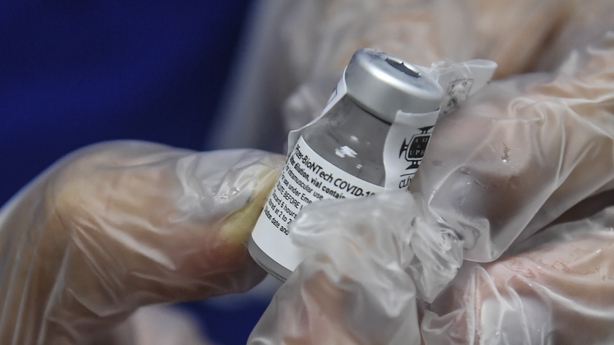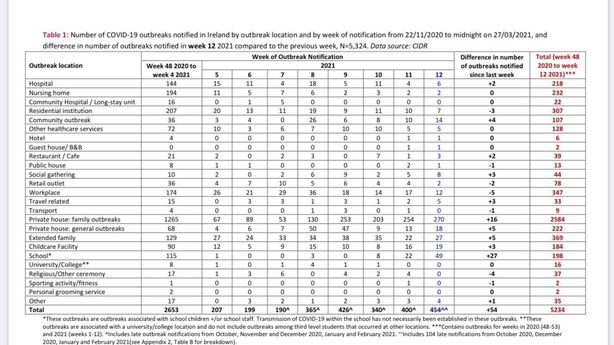The Taoiseach has said that a national portal for people to register for a Covid-19 vaccine is set to be up and running by the third week in April.
Micheál Martin also told the Dáil the target is that 80% of the population will have received the first dose of a vaccine by the end of June.
Speaking during Leaders' Questions, Mr Martin said the European Union plan is to have 70% of citizens fully vaccinated across the bloc by the end of July.
The Taoiseach defended the change to the vaccination schedule in Ireland, saying the new priority lists would ensure the most vulnerable were vaccinated first.
It has been confirmed that those in Category 9 aged 16-64 who are living or working in overcrowded settings are to be vaccinated in tandem with the new age-based vaccination. This relates mainly to the Traveller community, the Roma community and the homeless.
But the opposition accused the Government of reneging on commitments to workers.
They said this stems from a failure to put in place proper mechanisms to vaccinate groups such as carers, teachers and special needs assistants.
People Before Profit TD Richard Boyd Barrett urged the coalition to prioritise those working in education in parallel with the new age groupings.
He said the fact that more than one million people will be returning to school on 12 April means there is a heightened exposure to the virus in that setting.
Labour leader Alan Kelly said retail staff, workers in education and gardaí will feel very let down if the revised plan does not work.
Mr Martin responded by saying the vaccination programme is the key to bringing life back to normality.
He said the biggest factor in mortality and serious illness was age and the new system would remove barriers to quickly vaccinate older key workers.
Taoiseach @MichealMartinTD reiterates that the Govt's target is for 80% of people over the age of 16 to have receive at least a first dose of a Covid-19 vaccine by the end of June. He says there is 'more confidence' around vaccine deliveries | Read more: https://t.co/0mdOJCsCL5 pic.twitter.com/1SPAALwLQV
— RTÉ News (@rtenews) March 31, 2021
The Taoiseach defended the decision to change the priority list after concerns were raised by Fianna Fáil TDs and senators.
Minister for Education Norma Foley said NIAC should explain the rationale behind changes to the vaccine priority list.
She was speaking at a meeting of the Fianna Fáil parliamentary party which heard criticism of the changes and how they were announced.
Minister Foley told TDs and Senators that it is a significant change and it would be "helpful" if NIAC explained the rational behind the move.
Laois Offaly TD Barry Cowen said it was "far from ideal and disheartening" that the Government "pulled the rug from under" key workers.
Cathal Crowe and Cormac Devlin also raised the issue at a meeting of the parliamentary party tonight.
Meanwhile, Tánaiste Leo Varadkar told a meeting of Fine Gael TDs and Senators that the expert advice came just moments before Wednesday's Cabinet meeting.
He said there was no time for ministers to engage with unions or stakeholders or explain the rationale for the change.
Following strong criticism of the move from some of his party's TDs, Mr Varadkar said it was notable that concerns were raised on behalf of teachers and gardaí, but not others such as meat plant or childcare workers.
Minister says vaccine plan can accelerate immunisation
Minister for Health Stephen Donnelly said the change to the vaccination schedule will accelerate the benefit of immunisation.
At a technical briefing on the changes, he said that it would protect the most vulnerable as quickly as possible and open up the country as quickly as possible.
Minister Donnelly said he had spoken to Minister for Education Norma Foley and Minister for Justice Helen McEntee about briefing representative groups for gardaí and teachers and others on the changes.
Chair of the National Immunisation Advisory Committee (NIAC) Professor Karina Butler said that for every one person aged 19-24 hospitalised with the disease, six people aged 60-64 are hospitalised.
She said that once people understand why the changes are being made, they will accept it.
Prof Butler said health authorities want to avoid delays in hunting and searching for patients and the age-based system deals with that once the vulnerable are vaccinated.
HSE Chief Clinical Officer Dr Colm Henry said identifying people in Category 4 was proving "tricky and difficult" and that so far around 28,000 people in this very high risk group have received a dose of vaccine.
He said it was easier to identify certain patients in this group, those with cancer, kidney disease and people on dialysis, but other people were not under a single specialty in a hospital, which made the task more difficult.
The new age-based groups can expect to be called for vaccination during May, June and July.
Minister Donnelly also said that publishing forecasts of vaccine deliveries that the Government knows are likely to change, and possibly change many times, is "not helpful" and creates anxiety.
NIAC said an operationally simple, age-based programme for those aged 16-64 in descending order is the most equitable and efficient way to continue the vaccination roll-out.

It said that age remains the strongest predictor of hospitalisation, intensive care admission, and death from Covid-19.
NIAC said members of the Traveller and Roma community and people who are homeless are the only specific groups identified as being at significantly increased risk of hospitalisation, ICU admission or death, compared to the general population.
It added that while there may be a level of increased risk for certain ethnic groups, or certain occupations, the single highest risk factor remains age and these groups should be prioritised within their age cohort.
This is the advice given to Government, which has resulted in a change to the vaccination programme that now has nine groups instead of the original 15.
Meanwhile, Minister Donnelly has announced details of new walk-in Covid test centres.
In a post on Twitter, he said that the centres will be at the Education and Training Board in Finglas; Quay Street Car Park, Balbriggan; Navan O'Mahonys GAA Club, Navan, Co Meath; Crumlin GAA clubhouse; Athlone Regional Sports Centre; Town Hall/Library Car Park in Ballinasloe, Co Galway.
The minister also said that preparations are under way to prepare a test centre in Kildare.
Six further Covid-19 deaths, 411 new cases
There has been a total of 4,687 Covid-19 related deaths in Ireland to date.

The number of outbreaks rose by 54 to 454 in the week to last Saturday, according to data from the Health Protection Surveillance Centre.
The biggest rise in outbreaks was in schools, up 27 on the previous week to 49.
The total number includes 104 'late' notifications from Oct-Feb, which are mostly private house outbreaks.






